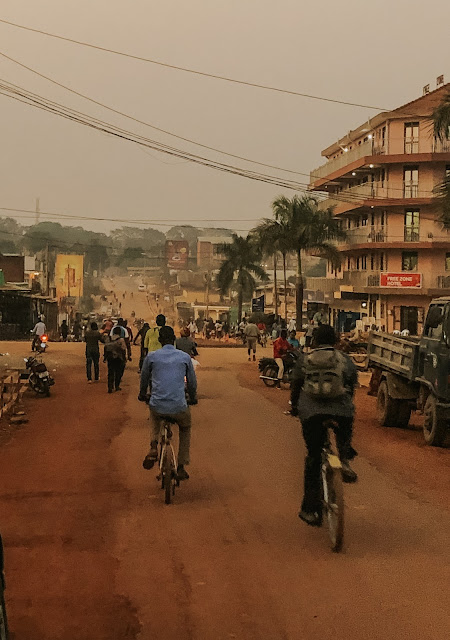Lugoro Tutte
My first project took place in Gulu with the organisation called Lugoro Tutte Disabled Group (LT). It is a small group which offers tailoring & knitting courses; school uniforms; different accessories and lots of custom orders.
Generally, persons with disabilities (PWDs) in Uganda are vulnerable by virtue of their impairment and negative societal attitudes arising from fear, ignorance, superstitions, neglect and lack of awareness. Two decades of war in Northern Uganda didn't really help with their situation and Okot, the founder, wanted to do something about it because he knows the struggles of the PWDs very well. So, back in 1994 he established this group with a sole purpose of helping the disabled and their families increase their living standards in the community. He is truly the sweetest person I have had a pleasure to meet here in Uganda
Anyways, when we got to the part of examining the organisation's needs and their expectations on me, their thoughts were all on one thing. Money. I had to explain them politely that I was not sent here to give or find them money but rather help them gain the needed skills, so they can make their own. That is something I really love about Mondo's approach. Mondo taught us that we should help the organisations help themselves. Share our skills, so that one day they will not need Mondo’s help anymore and can proceed self-sustainably on their own.

However, my time in Gulu was very short. Only 1 month. So, I was tempted to do everything myself in order to achieve fast results. But this wouldn't have helped them in the long-run, right. So, I had to remind myself about the idea of more sharing than doing. Therefore, first it was important just to sit back, assess their business activity and then go step by step.
In the beginning I was very optimistic. I remember telling my friend, “First week I will cover their finances and then go on focusing on marketing, teaching them basics and finding them new distributors.” Haha, I was surely overestimating myself because in the end I didn’t get further than their finances.
The problem is that, the things I considered obvious, are not so obvious here. It is not like everybody has had a chance to study the basics of business foundation and moreover how to manage their money, how to do the bookkeeping, how to do the product monitoring, etc. That is totally understandable and that is why I had to support them with all that knowledge I have.
When I asked them, “But how do you pay your bills? LT has around 200,000 UGX (50 EUR) worth of monthly fixed expenses.” The answer was, “We don’t know.”
I realised that like many other SME’s in Uganda, LT is also relying on the foreign support, which makes them extremely dependent. That had to change. We gathered everybody and I made a proposal of 60/40 profit sharing. The discussion was long and intense. Of course, it is no surprise that people wouldn't like to give away a share of their earnings. Nevertheless, they decided to give it a try.
Other option could have obviously been increasing prices, but it is not that simple in this market. As everybody is selling the same products, you cannot just increase your prices. The locals will simply not buy from you because there are already so many others to choose from. I understood it when I visited Gulu’s main market for the first time and saw so many tailoring shops, all selling the exact same things.
What about product development? Again tricky. If you are in a business like tailoring, copying is very easy to come. Once you differentiate, you’ll have approximately 6 months before everybody else is doing the same. It is just a typical thing in Uganda or Africa. It is not like in Europe, where being unique and original is the goal.
Although, this doesn’t mean we have to just deal with it and not change anything. What I am trying to say, is that 1 month was clearly not enough to work on their marketing strategy. It was just enough of time to fix some of their core issues. And please try to understand that 1 month in Africa is a very, very, very little time to achieve anything. Everything takes soooo much time, that sometimes I don’t even know if I should cry or laugh.

Overall, I really enjoyed working with them. They were such a kind group. Going to their office was the highlight of my day. They were smiling a lot, showing a lot of initiative, asking for my opinion, taking care of me and feeding me like crazy. Haha, they even thought that I was starving because I couldn't eat their enormous lunch portions :D
Sadly, my chapter in Gulu has ended and I wish the best of luck to the next volunteer that will work with this amazing group. I promised to keep helping them when needed and checking up on them after some periods of time.
Sadly, my chapter in Gulu has ended and I wish the best of luck to the next volunteer that will work with this amazing group. I promised to keep helping them when needed and checking up on them after some periods of time.
Until next time!














